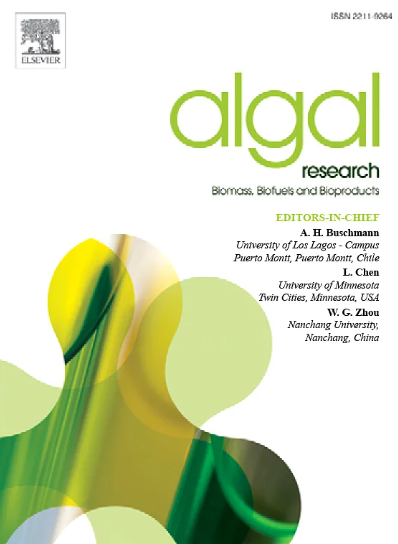The interplay between Ca2+ and ROS in regulating β-carotene biosynthesis in Dunaliella salina under high temperature stress
IF 4.6
2区 生物学
Q1 BIOTECHNOLOGY & APPLIED MICROBIOLOGY
Algal Research-Biomass Biofuels and Bioproducts
Pub Date : 2025-03-28
DOI:10.1016/j.algal.2025.104023
引用次数: 0
Abstract
Temperature influences biomass and β-carotene production in Dunaliella salina, while high temperature generally induces β-carotene biosynthesis via increased ROS, the intricate and incomplete mechanisms necessitate the identification of novel regulators and their interactions with ROS. A comprehensive analysis of physiological responses to different temperatures was investigated in this study, including cell proliferation, biomass growth, carbon utilization efficiency, β-carotene synthesis, chlorophyll profiles, photosynthetic efficiency, ROS, antioxidant content, activity of antioxidant enzymes, free radical scavenger capacity, and Ca2+ level. The results showed that 34 °C is the optimal temperature for β-carotene accumulation, and high temperature impairs chlorophyll, photosynthesis, and carbon utilization by enhancing oxidative stress. High temperature (40 °C vs 25 °C) triggers a simultaneous increase in ROS (24.34-fold) and Ca2+ levels (16.04-fold), implicating Ca2+ as a temperature-sensitive regulator of β-carotene that potentially interacts with ROS. Further chemical treatments at 34 °C demonstrated that Ca2+ supplementation enhanced biomass and increased β-carotene yield and content by 4.81 %, 11.79 %, and 19.99 %, respectively. Supplementation with H2O2 increased the yield and content of β-carotene (5.62 % and 30.57 %) but reduced biomass (19.23 %). Notably, supplemented H2O2 decreased cellular Ca2+, while supplemented Ca2+ enhanced antioxidant capacity. This study identifies Ca2+ as a novel regulator of high-temperature β-carotene biosynthesis and shows its interplay with ROS.
求助全文
约1分钟内获得全文
求助全文
来源期刊

Algal Research-Biomass Biofuels and Bioproducts
BIOTECHNOLOGY & APPLIED MICROBIOLOGY-
CiteScore
9.40
自引率
7.80%
发文量
332
期刊介绍:
Algal Research is an international phycology journal covering all areas of emerging technologies in algae biology, biomass production, cultivation, harvesting, extraction, bioproducts, biorefinery, engineering, and econometrics. Algae is defined to include cyanobacteria, microalgae, and protists and symbionts of interest in biotechnology. The journal publishes original research and reviews for the following scope: algal biology, including but not exclusive to: phylogeny, biodiversity, molecular traits, metabolic regulation, and genetic engineering, algal cultivation, e.g. phototrophic systems, heterotrophic systems, and mixotrophic systems, algal harvesting and extraction systems, biotechnology to convert algal biomass and components into biofuels and bioproducts, e.g., nutraceuticals, pharmaceuticals, animal feed, plastics, etc. algal products and their economic assessment
 求助内容:
求助内容: 应助结果提醒方式:
应助结果提醒方式:


